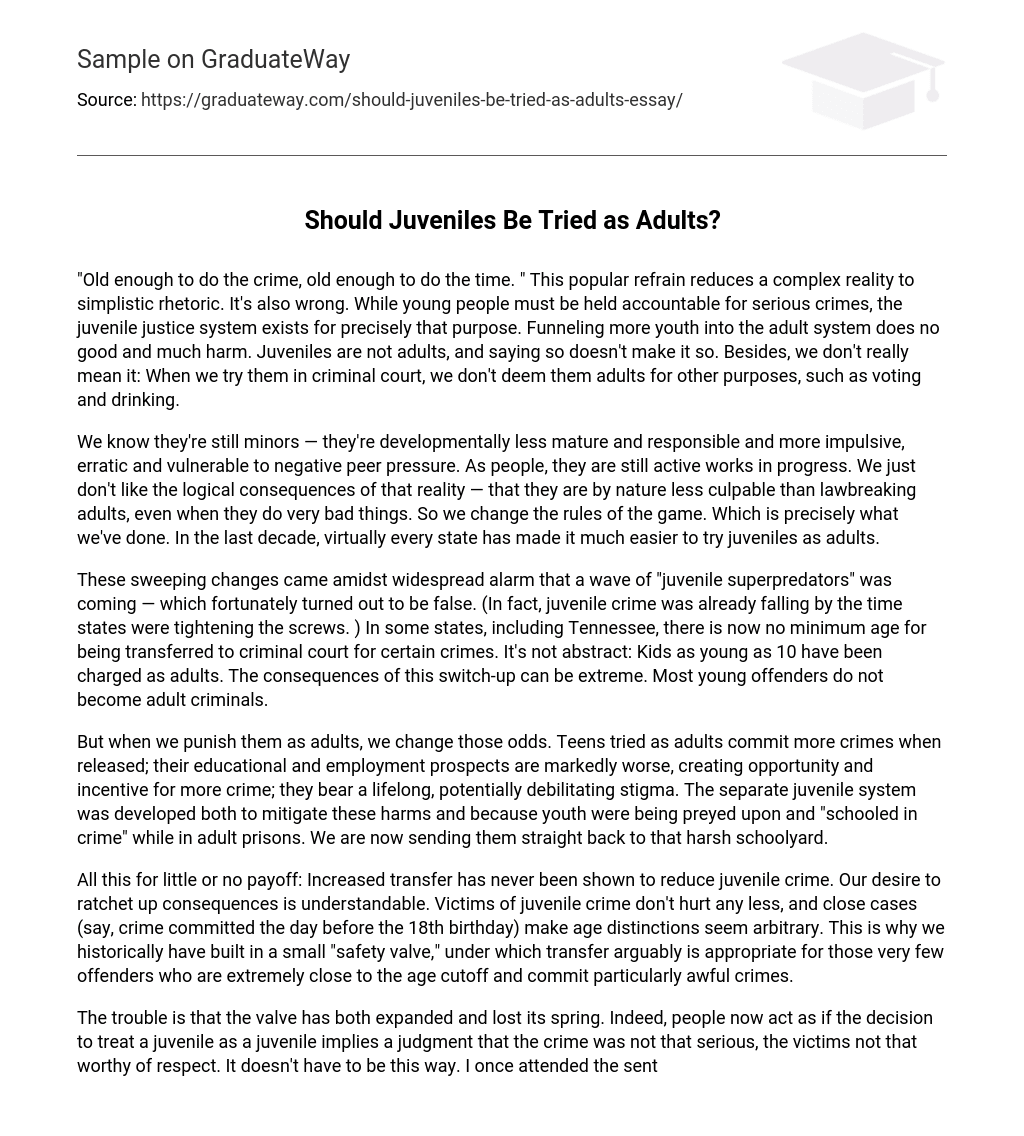“Old enough to do the crime, old enough to do the time.” This phrase oversimplifies a complex situation and is incorrect. Although young individuals should be held responsible for their actions, the juvenile justice system is specifically designed for that purpose. It is detrimental to send more young people into the adult system. Juveniles are not adults, and simply stating otherwise does not change reality. Furthermore, when we try them in criminal court, we do not consider them adults for other matters like voting and drinking.
We understand that they are young and not as mature or responsible as adults. They are more impulsive, unpredictable, and easily influenced by negative peers. As individuals, they are still developing and growing. However, we dislike the logical outcomes of this fact – that they are inherently less at fault than adults when they commit serious offenses. Consequently, we alter the regulations. This is exactly what has transpired. Over the past ten years, nearly every state has significantly simplified the process of trying minors as adults.
Significant modifications were made due to concerns about an increase in juvenile superpredators, but these fears turned out to be unfounded. It is worth noting that youth crime rates were already decreasing before these changes occurred. Currently, in Tennessee and other states, there are no age restrictions for transferring individuals accused of certain crimes to the criminal court system. Consequently, children as young as 10 years old have been tried as adults. The consequences of this change can be significant, especially considering that most youthful offenders do not become adult criminals.
Teenagers who are punished as adults face detrimental effects on their future. Once released, they have a higher probability of persisting in criminal activities and encountering challenges with education and employment. This fosters an atmosphere that promotes further illicit behavior. Furthermore, they must confront the enduring stigma associated with their actions, which can impede their progress in life. To tackle these issues and safeguard young individuals from victimization and adverse influences within adult prisons, a distinct juvenile system was implemented. Nevertheless, current practices involve reintegrating them into the very environments we aimed to protect them from.
The increase in transfer of juvenile offenders has never been proven to decrease juvenile crime. It is understandable that we want to increase consequences for these offenders. Victims of juvenile crime still experience the same amount of pain, and cases that are close to the age cutoff make it seem arbitrary to differentiate based on age. That is why we have historically included a small “safety valve” that allows for transfer in cases where the offender is very close to the age cutoff and has committed heinous crimes.
The valve has increased in size and lost its spring. Moreover, there is a belief that treating a young offender as a juvenile diminishes the gravity of the crime and displays disrespect towards the victims. Nevertheless, it doesn’t have to be like this. I personally observed Clarence’s trial, an adolescent who murdered Pauline, a choir member. The proceedings in the juvenile court were equally serious and heart-wrenching compared to any other court. Eventually, Clarence was sent to a secure facility resembling a prison.
His family was destroyed, including Pauline’s. The only small hope was that Clarence, while in prison, could mature and become a law-abiding adult. We hoped that he would not be further negatively influenced while incarcerated. However, when we transfer our youth to the adult justice system, we are eliminating even this small hope. On the other hand, juvenile sentences protect our youth from the specific threats of adult facilities and maintain the potential for rehabilitation, no matter how slim it may appear.





